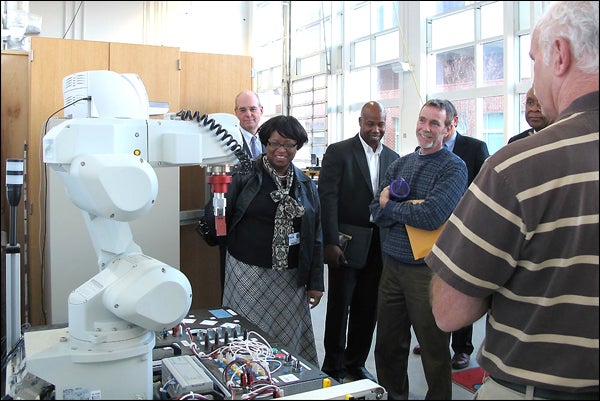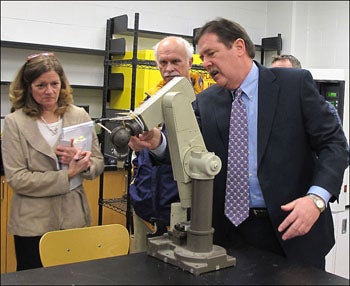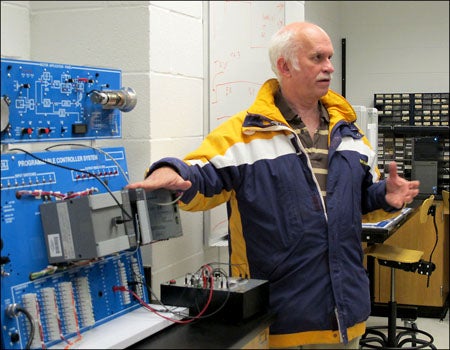REACHING OUT
ECU faculty partner with region on technology

Visitors from Halifax Community College watch as a Mitsubishi robot functions in a College of Technology and Computer Science lab. The robot is used to train East Carolina University students. (Photos by Kathryn Kennedy)
Seven delegates from Halifax Community College crowded around a table at East Carolina University’s College of Technology and Computer Science in mid-January staring at what looks like industrial junk.
The programmable universal machine for assembly, commonly called a PUMA, is the product of a bygone era. Commonly used by manufacturers in the 1980s, it is a dinosaur compared to the robots running functions a few classrooms away.
But ECU Senior Keith Eichenberg brought the machine back to life in December. Now the functional robot resides in Halifax County – a tangible symbol of the burgeoning partnership between the two schools.
“We’re looking for ways to raise the visibility of the college,” said David Harrawood, director of ECU’s Center for Innovation in Technology and Engineering. “Throughout eastern North Carolina, the community colleges are seen as learning centers. It’s good for us to link with them.”
Outreach important to ECU
As well as having regular conversations with Pitt Community College and now Halifax, Harrawood also partners with community colleges in Beaufort, Lenoir, Nash and Wilson counties. He hopes to bring delegates from those institutions to campus in the future.
“It’s kind of like neighbors leaning over the fence,” he said, explaining that they started with Pitt because of its proximity and size. He then reached out to Halifax, a smaller college located farther from ECU.

David Harrawood, director of ECU’s Center for Innovation in Technology and Engineering, demonstrates how a PUMA robot works to visitors from Halifax Community College including, at left, Dean of Curriculum Programs B.T. Brown.
“Our college places a high value on our partnerships with community colleges,” said Dr. David White, dean of the College of Technology and Computer Science. “Working together, we can provide clear pathways for community college students to enter our college programs and gain degrees that will lead to exciting career opportunities.”
Community college officials agree.
“It’s a great deal because we have a lot of students who leave here and transfer in as juniors,” said Dr. Van Madray, dean of Construction and Industrial Technology at PCC.
Madray said about half of all Pitt students plan to transfer to a four-year institution, and many from his department go on to study construction management or engineering.
“We’re all about applied technology degrees,” he said. “(Students) come here, they get a lot of the hands-on stuff. At ECU, they get the higher level of management.”
He added that they encourage students to take that next step.
“Maybe you don’t want to be a welder for the rest of your life,” Madray said. “Maybe you want to own your own welding company.”
Representatives from the College of Technology and Computer Science will next meet with PCC officials Feb. 14.
Sharing resources
Meanwhile, Halifax Community College is developing a “two plus two” program, referring to the two years a student can spend at HCC before transferring to ECU their final two years.
Business and Industry Coordinator Larry Crisafulli said he realized several years ago that a relationship with an entity like ECU was necessary to both attract businesses to Halifax County and to keep positions filled at existing manufacturers. Skilled employees would come to the area for jobs, but had trouble adjusting to the rural setting, he said.
“When we had to provide training, we realized we were not equipped to do so,” Crisafulli said of educating local students. “We could not locate the caliber of instructors needed.”
Visiting faculty from ECU can train staff and students alike. The college is partnering exclusively with ECU now because the college provides what Crisafulli terms “a quality service.”
The January visit from HCC officials included presentations from each of the department heads in Technology and Computer Science, as well as tours of the various labs used in instruction at ECU.
In the technology and engineering high bay lab, HCC President Ervin Griffin Sr. eyed the rapid prototyping machine with great interest, running his fingers over the grooves of a small plastic model it produced in minutes.
“We need to buy one of these,” he shouted over his shoulder to his colleagues.
Harrawood quickly chimed in.
“As long as it’s here, you can use it.”
“I’m trying to find ways to weave technology into the fabric of eastern North Carolina,” Harrawood later explained. “This opens up the pathways of communication.”

Jim Linn, instructor with the Department of Technology Systems, shows a programmable controller system used to train students to visitors from Halifax Community College.